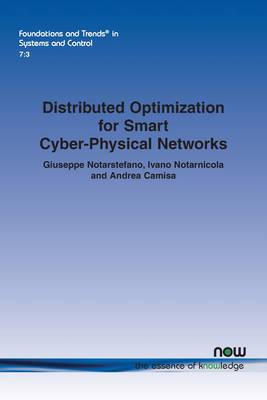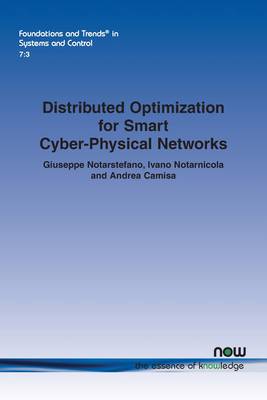
- Afhalen na 1 uur in een winkel met voorraad
- Gratis thuislevering in België vanaf € 30
- Ruim aanbod met 7 miljoen producten
- Afhalen na 1 uur in een winkel met voorraad
- Gratis thuislevering in België vanaf € 30
- Ruim aanbod met 7 miljoen producten
Zoeken
Distributed Optimization for Smart Cyber-Physical Networks
Giuseppe Notarstefano, Ivano Notarnicola, Andrea Camisa
€ 100,95
+ 201 punten
Omschrijving
In an increasingly connected world, the term cyber-physical networks has been coined to refer to the communication among devices that is turning smart devices into smart (cooperating) systems. The distinctive feature of such systems is that significant advantage can be obtained if its interconnected, complex nature is exploited. Several challenges arising in cyber-physical networks can be stated as optimization problems. Examples are estimation, decision, learning and control applications. In cyber-physical networks, the goal is to design algorithms, based on the exchange of information among the processors, that take advantage of the aggregated computational power. Distributed Optimization for Smart Cyber-Physical Networks provides a comprehensive overview of the most common approaches used to design distributed optimization algorithms, together with the theoretical analysis of the main schemes in their basic version. It identifies and formalizes classes of problem set-ups that arise in motivating application scenarios. For each set-up, in order to give the main tools for analysis, tailored distributed algorithms in simplified cases are reviewed. Extensions and generalizations of the basic schemes are also discussed at the end of each chapter. Distributed Optimization for Smart Cyber-Physical Networks provides the reader with an accessible overview of the current research and gives important pointers towards new developments. It is an excellent starting point for research and students unfamiliar with the topic.
Specificaties
Betrokkenen
- Auteur(s):
- Uitgeverij:
Inhoud
- Aantal bladzijden:
- 148
- Taal:
- Engels
- Reeks:
- Reeksnummer:
- nr. 19
Eigenschappen
- Productcode (EAN):
- 9781680836189
- Verschijningsdatum:
- 11/12/2019
- Uitvoering:
- Paperback
- Formaat:
- Trade paperback (VS)
- Afmetingen:
- 156 mm x 234 mm
- Gewicht:
- 217 g

Alleen bij Standaard Boekhandel
+ 201 punten op je klantenkaart van Standaard Boekhandel
Beoordelingen
We publiceren alleen reviews die voldoen aan de voorwaarden voor reviews. Bekijk onze voorwaarden voor reviews.











